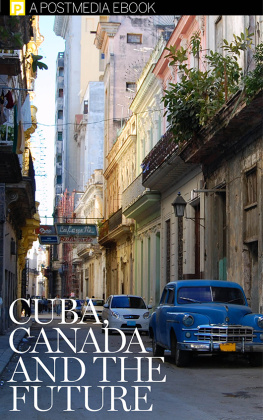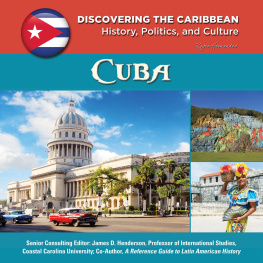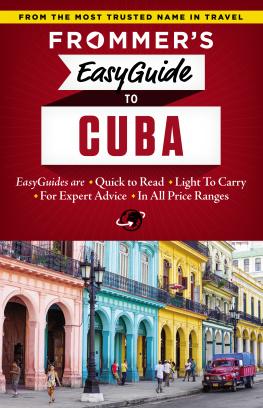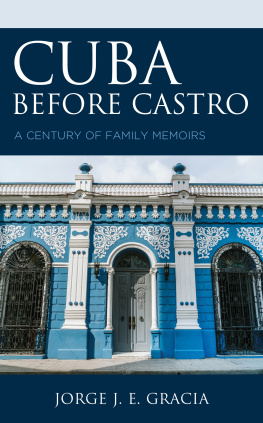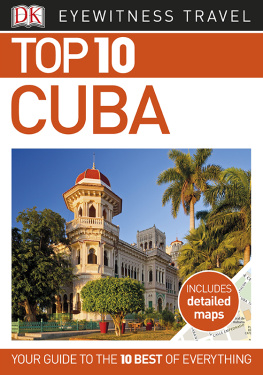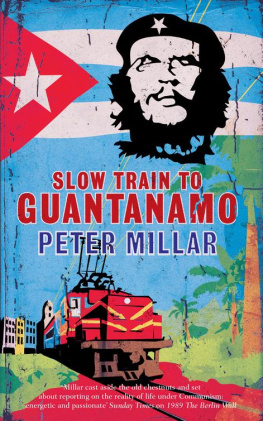I was twelve years old when the rebel army of Fidel Castro and his bearded men entered on Havana in January 1959. Like most people in Cuba at that time, I could not imagine how far the consequences of this event were going to impact our lives, and even less that, sixty years later, we would still be dealing with the same main characters and events of that so-called revolu tion.
I came from a modest Cuban family. My father worked in a store in Havana and my mother was a housewife. I was their only son.
When President Batista left Cuba and Fidel Castro and his people formed their new government, I was starting high school at the Institute of Havana, a public high school, after finishing my primary education in one of the best private schools that existed at that time in Ha vana.
Until 1959, my family had been a very coherent entity, with close ties between us and my aunts, uncles, cousins, and even second cousins. No matter what ideas or economic status the different members of it had, we knew that we always could count with them and vice versa. This somehow innocent institution was going soon to suffer the brutal impact of the new order established by Castros poli cies.
I had witnessed, like everybody in Cuba, all the main events that started to change the normal path of life of our society during the two years previous to the fall of Batistas regime. There were air force planes that flew over Havana at night, coming from operations against Castros forces in other provinces; there was the noise of bombs exploding almost every night in Havana; there were people who collected money for the revolution; there was also the impact of the images shown by the press, like those of the death of the President of the Student Federation of Havana University, Jose A. Echevarria, killed by the police after reading a manifesto in a radio station or those of the assassination by the revolutionaries of Blanco Rico, an army coronel, in the middle of Havana and also those of the attack to the presidential palacethose were crude images that became very difficult to forget. It was a time that was full of news and ru mors.
At the high school, we all got used to the interruption of classes, when somebody linked to the revolution called for a strike, or when the students innocently exploded some little flasks called stinking bombs, which were sold to be used as a joke in a store called the House of Tricks and became a favorite for those wishing to interrupt classes to go home early in the name of the revolu tion.
My parents had never been involved in politics, and other than some advice to be careful, I did not get much input from them on what was happening or the way they saw it. In any case, I felt that they had some sympathy for the revolu tion.
Like most of the people in Cuba, we had friends and relatives who were members of the national army and the government and also among the people who were sympathizers of the revolu tion.
As children, we dealt with all of them the same, but as time passed, we started to feel that there was something different affecting those in Batistas side, and we could feel the first waves of fright for what could happen if the revolution won.
I could also see how members of my family were taking more radical sides in that process, which was gradually involving the Cuban soc iety.
A couple of years after Castros forces entered Havana, I saw how some members of my family and also the families of some of my closest friends started to migrate to the United States while other relatives and friends decided to remain in Cuba, but clearly, they were not happy either with the new order and a result some of them ended going to prison for their opposition to Ca stro.
In the meantime, other members of my family, including my parents, became sympathizers of the new re gime.
I was too young and did not have any political knowledge that could help me to understand well the process Cuba was experiencing, and due to this, I followed my parents and became attracted by the slogans of the revolution, which indicated that Cuba needed a big political and administrative change, even when, perhaps due to my private school background, I had reserves about the whole process, something that spontaneously limited my degree of compromise wit h it.
Looking backward, I realize how difficult it was for me to avoid the attraction of those slogans of the revolution, which were being promoted by a barrage of political propag anda.
During the first decade of Castros rule, I took part in some activities organized by the government for young people, the main one being a Literacy Campaign in which I went to live with a family of farmers in a rural area of Holguin, a large city of Oriente Province, where I taught some people the basic elements of reading and writing in 1961. I could not realize at that time that the whole campaign was something used as a tool for indoctrination by the new communist govern ment.
I started my studies of civil engineering at the University of Havana a couple of years later, and I was lucky to receive classes from some good civil engineers who had remained in Cuba, many of whom regularly criticized, in their close circle of friends, many aspects of Castros policies, having differences with his plans and ideas, and this left a deep influence on my v iews.
I remember the main events of the revolution during those years, and I witnessed how Castro gradually assumed his absolute powers, as well as the growing number of disparate actions taken by his govern ment.
I was also able to carry on many technical studies in my field, which allowed me to travel most of the island, learning firsthand about many things that other students had no idea were happening, which gave me a contrasting view between the government propaganda and the real situation of the island and the disaster the revolution was crea ting.
It was a bit unusual during those days for a young student of engineering to be interested in cultural and economic matters like I was, and this brought me to meet some prominent Cuban researchers and intellectuals, many of whom were also critical of Castros policies, and this again gave me a broader perspective about the process that was going on, which, otherwise, I might have never had.
By the time I was finishing my career, UNESCO was implementing a program to assist the University of Havana in the development of some fields of engineering, and this included a number of scholarships. One scholarship was in the field of maritime transport and ports, which was the one in which I was specializing, and a short time after my graduation, I received a scholarship to go to the University of Wales, in Great Britain, to carry on post-graduate studies. During this time my family had to remain in Cuba.




